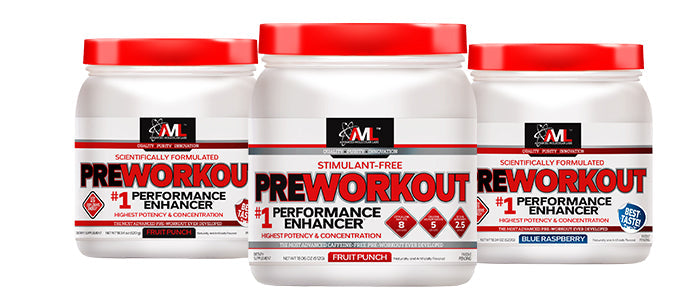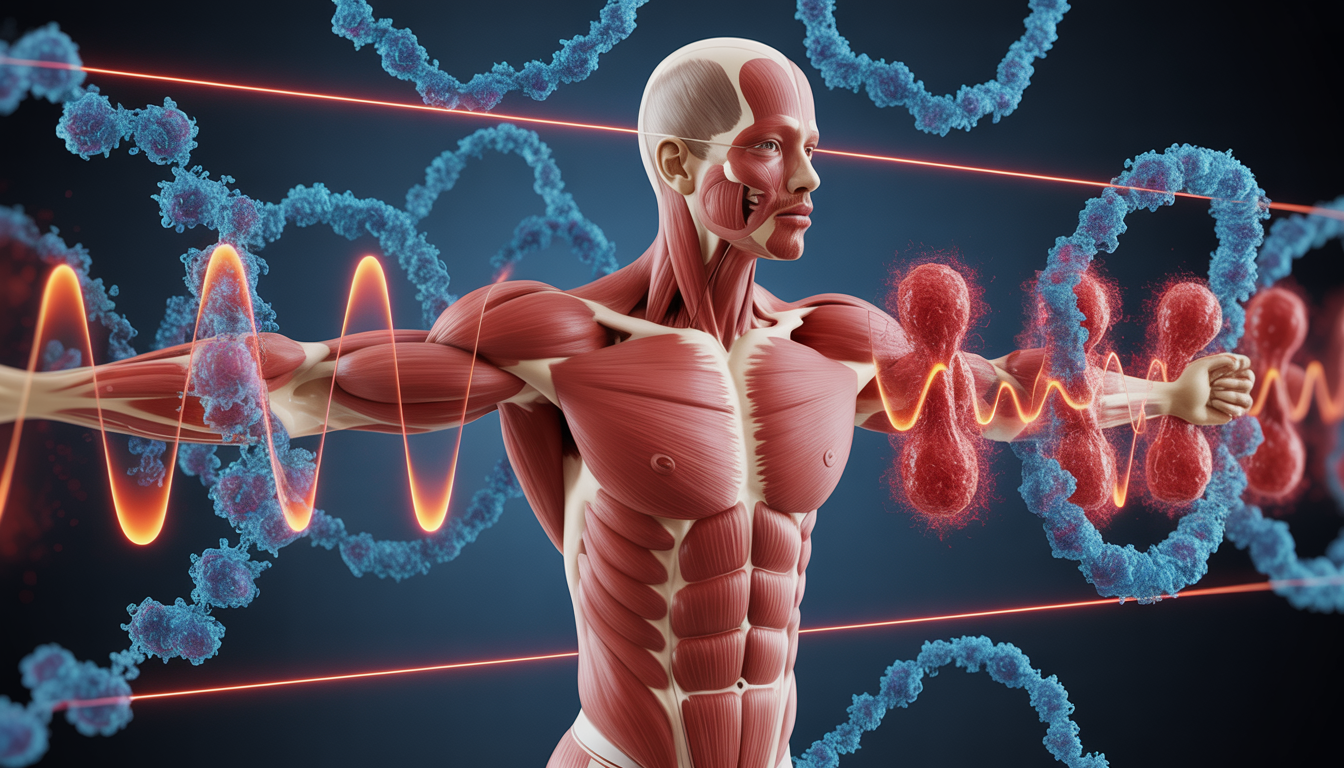


Caffeine Free Pre Workout: Clean, Natural, and Safe Supplement
Alexander Graham Bell, inventor of the telephone, once said "Before anything else, preparation is the key to success." We here at AML absolutely agree, which is why we've created AML Preworkout, a scientifically backed formula designed to completely prepare you for your next workout.
AML Preworkout packs your muscle cells with energy, increasing endurance and pushing your muscles to work harder and longer. Add in Preworkout's specially chosen ingredients for boosting mood and motivation and you have a winning formula for workout intensity and resilience. This clean pre workout is designed to enhance your athletic performance naturally, making it one of the healthiest pre workout supplements available.
Intensify Energy and Motivation
Motivation is a key factor in bodybuilding success. We all know that there are days when it's hard to get up and get pumping iron. A primary contributor to pre-workout fatigue is a weary central nervous system (CNS) that isn't sending the right signals to your body and brain. Fortunately, AML has discovered a unique blend of compounds that conquer CNS fatigue and get you motivated and focused ahead of your caffeine free pre work out.
Dopamine Increases Drive To Exercise
Neurotransmitters are chemicals that allow neurotransmission, the sending of signals to nerves in the body. The function of neurotransmitters is key to motivation and energy before your workout, especially when using a pre workout supplement natural formula.
Two of the most important neurotransmitters for combating pre-workout fatigue are serotonin and dopamine. Serotonin is associated with sleep and drowsiness, while dopamine has a powerful influence on motivation.
If the serotonin to dopamine ratio gets too high, your body will feel tired and getting motivated to work out will become harder. On the other hand, if dopamine levels can be increased so that the ratio gets smaller, CNS function will improve and your exercise performance will get better.
AML Preworkout Is Loaded With The Most Potent Dopamine Enhancers
Since reduced dopamine levels equals reduced motivation and performance, we've designed AML Preworkout to give your dopamine levels a boost with the most potent dopamine enhancers available today. This formulation stands out as the safest pre workout option for those seeking a natural pre workout drink.
Studies have shown that taking the dopamine precursor tyrosine is an effective performance booster, increasing the length of an exercise session by up to 16 percent. Not only does tyrosine help you exercise longer, it increases the body's tolerance for exercise, letting you work out more without feeling like you've expended a lot of extra effort.
Preworkout combines powerful tyrosine with the tropical plant mucuna pruriens and folic acid, both of which have been shown to increase dopamine levels in the brain.
Increase Dopamine and Adrenaline For An Extra Boost
The hormone adrenaline is well known for supporting the "fight or flight" response in the body. A shot of adrenaline through your body is a potent performance enhancer - adrenaline activity increases levels of glucose and fatty acids in the blood, providing muscle cells with more energy. AML Preworkout simultaneously increases both dopamine and adrenaline for even greater mental focus, offering the advantages of pre workout supplements without relying on excessive caffeine.
The Energetic Buzz From Caffeine
The performance-enhancing buzz from caffeine has two components. First, caffeine enhances the contraction force of the muscles and boosts muscle energy for a more powerful weightlifting workout. Second, caffeine stimulates the central nervous system and provides a welcome increase in mental focus. Consuming caffeine gives you a surge of both dopamine and adrenaline for greater concentration and intensity, which is why we add it to AML Preworkout.
Piperine Triggers Extra Adrenaline
Piperine, a natural compound that occurs in black pepper, has been show to trigger adrenaline release by stimulating the nervous system. Piperine also supports the gastrointestinal absorption and subsequent use of the other nutrients in AML Preworkout.
AML Preworkout Improves Muscular Endurance
A truly effective pre-workout supplement is one that improves muscular endurance for extended intensity during your workout. Fortunately, AML Preworkout is loaded with the amino acid beta-alanine, which has many positive effects on health and exercise performance.
Beta-alanine reduces the acidity in muscles and works within muscle cells to buffer the negative effects of lactic acid on exercise capacity. That's why beta-alanine is a key ingredient for improved muscle endurance during workouts.
Enhanced Blood Flow and Stamina
AML Preworkout is loaded with citrulline, an amino acid that has been shown to increase blood flow in the muscles. The presence of citrulline triggers the body to relax the muscles of the arterial walls, opening the arteries up and increasing blood flow. This leads to increased stamina, thanks to more essential nutrients and oxygen being pumped into hardworking muscles.
AML Preworkout also contains watermelon, beetroot and grape skin extracts. These natural compounds have been shown to powerfully stimulate the production of nitric oxide for enhanced vasodilation and better muscle performance.
Potassium and Magnesium Boost Circulation
Potassum and magnesium citrate are powerful compounds with a measurable effect on circulation. Studies have shown that higher potassium intake can reduce the risk of stroke and other cardiovascular diseases. These compounds enhance vasodilation, boosting blood circulation and lowering blood pressure for a healthier workout. The addition of citrate upgrades exercise performance for maximum power.
Enhance Blood Flow With Folic Acid
BH4 is a compound that boosts the production of nitric oxide, improving blood flow to the muscles. Too little BH4 in the body can adversely affect the circulation and contribute to circulatory disease. Taking BH4 as a supplement has not proven to be an effective remedy, however, consumption of folic acid has been shown to increase BH4 production and improve nitric oxide levels, making it an ideal addition to AML Preworkout.
Citruline Improves Exercise Performance
Exercise-induced muscle fatigue is a serious issue for any dedicated bodybuilder. One of the key contributing factors to exercise-induced muscle fatigue is the accumulation of both ammonia and lactic acid within the muscles.
Ammonia is a byproduct of intense muscle contractions, which can quickly build up and cause fatigue. Ammonia buildup can also lead to increased lactic acid in the muscles, inhibiting exercise performance.
Citruline is an amino acid that reduces the accumulation of ammonia and brings down lactic acid levels in the muscles, leading to a noticeable improvement in exercise performance.
Enhance Muscle Power With Preworkout's Unique Blend
To be truly effective, any pre-workout supplement needs to increase muscle strength and power output. That's why AML Preworkout is loaded with the most effective muscle-building and performance-enhancing compounds on the market today. It stands out as a pre workout powder without caffeine, ideal for those seeking the best non stimulant pre workout option.
Improved Fluid Balance Leads To Greater Strength Gains
Maintaining cell volume and fluid balance during a workout is a must when it comes to combating dehydration. AML Preworkout is formulated with the most researched source of betaine (from BetaPower® Natural Betaine), which plays a key role in supporting cell hydration. Betaine is naturally found in many foods such as whole grains, spinach and shellfish. Adding it to our formula brings the positive effects of betaine direct to your muscles.
As well as keeping your cells hydrated, betaine has been shown to increase muscle protein synthesis, pack more anaerobic power into your moves, and reduce abdominal fat.
AML Preworkout Is Leucine Free To Protect Muscle Growth
Leucine is powerful muscle booster that leads to increased muscle growth when used after resistance training. However, when taken pre-workout, leucine can actually impair muscle performance and diminish the energy available for muscle movement. That's why we've formulated our Preworkout supplement to be completely leucine free.
Utilize ROS Exposure For Greater Muscle Growth And Recovery
Intense weightlifting puts stress on muscle cells, causing muscle damage and the need for muscle regeneration and recovery. Evidence is now emerging which suggests that reactive oxygen species (ROS) that are produced during a workout can aid in the recovery process. ROS are chemically reactive molecules that contain oxygen, and their presence can aid in muscle regeneration.
Many bodybuilding supplements contain antioxidants such as vitamins C and E, and the amino acids N-acetyl-cysteine and taurine, all of which can hinder the regenerative powers of ROS. That's why we've chosen to formulate Preworkout without these antioxidants, encouraging the natural generation of ROS and better muscle growth and recovery.
AML Preworkout is a scientifically backed formula that is packed with all the nutrients and compounds your body needs to prepare it for your best workout yet. As a healthy pre workout option, it provides the benefits of performance enhancing supplements while maintaining a clean ingredient profile.
CLICK HERE TO ORDER NOW
References:
1. Acworth I, Nicholass J, et al. Effect of sustained exercise on concentrations of plasma aromatic and branched-chain amino acids and brain amines. Biochem Biophys Res Commun 1986;137, 149-153.
2. Davis JM and Bailey SP. Possible mechanisms of central nervous system fatigue during exercise. Med Sci Sports Exerc 1997;29, 45-57.
3. Roelands B, Watson P, et al. A dopamine/noradrenaline reuptake inhibitor improves performance in the heat, but only at the maximum therapeutic dose. Scand J Med Sci Sports 2012;22, e93-98.
4. Tumilty L, Davison G, et al. Oral tyrosine supplementation improves exercise capacity in the heat. Eur J Appl Physiol 2011;111, 2941-2950.
5. Alleman RJ Jr, Canale RE, et al. A blend of chlorophytum borivilianum and velvet bean increases serum growth hormone in exercise-trained men. Nutr Metab Insights 2011;4, 55-63.
6. Tharakan B, Dhanasekaran M, et al. Anti-Parkinson botanical Mucuna pruriens prevents levodopa induced plasmid and genomic DNA damage. Phytother Res 2007;21, 1124-1126.
7. Katzenschlager R, Evans A, et al. Mucuna pruriens in Parkinson's disease: a double blind clinical and pharmacological study. J Neurol Neurosurg Psychiatry 2004;75, 1672-1677.
8. Zheng X, Takatsu S, et al. Acute intraperitoneal injection of caffeine improves endurance exercise performance in association with increasing brain dopamine release during exercise. Pharmacol Biochem Behav 2014;122, 136-143.
9. McNamara FN, Randall A and Gunthorpe MJ. Effects of piperine, the pungent component of black pepper, at the human vanilloid receptor (TRPV1). Br J Pharmacol 2005;144, 781-790.
10. Harris RC, Tallon MJ, et al. The absorption of orally supplied beta-alanine and its effect on muscle carnosine synthesis in human vastus lateralis. Amino Acids 2006;30, 279-289.
11. Stellingwerff T, Anwander H, et al. Effect of two beta-alanine dosing protocols on muscle carnosine synthesis and washout. Amino Acids 2010;42, 2461-2472.
12. Baguet A, Koppo K, et al. Beta-alanine supplementation reduces acidosis but not oxygen uptake response during high-intensity cycling exercise. Eur J Appl Physiol 2010;108, 495-503.
13. Hoffman J, Ratamess NA, et al. Beta-alanine and the hormonal response to exercise. Int J Sports Med 2008;29, 952-958.
14. Grimble GK. Adverse gastrointestinal effects of arginine and related amino acids. J Nutr 2007;137, 1693S-1701S.
15. Heyland DK, Dhaliwal R, et al. Canadian clinical practice guidelines for nutrition support in mechanically ventilated, critically ill adult patients. JPEN J Parenter Enteral Nutr 2003;27, 355-373.
16. Cynober L. Pharmacokinetics of arginine and related amino acids. J Nutr 2007;137, 1646S-1649S.
17. Schwedhelm E, Maas R, et al. Pharmacokinetic and pharmacodynamic properties of oral L-citrulline and L-arginine: impact on nitric oxide metabolism. Br J Clin Pharmacol 2008;65, 51-59.
21. Blanch N, Clifton PM, et al. Effect of high potassium diet on endothelial function. Nutr Metab Cardiovasc Dis 2014.
22. D'Elia L, Iannotta C, et al. Potassium-rich diet and risk of stroke: Updated meta-analysis. Nutr Metab Cardiovasc Dis 2014;24, 585-587.
23. Russell C, Papadopoulos E, et al. Acute versus chronic supplementation of sodium citrate on 200 m performance in adolescent swimmers. Journal of the International Society of Sports Nutrition 2014;2014, 11:26 11, 1028-1037.
24. Gaede P, Vedel P, et al. Multifactorial intervention and cardiovascular disease in patients with type 2 diabetes. N Engl J Med 2003;348, 383-393.
25. Moens AL, Kietadisorn R, et al. Targeting endothelial and myocardial dysfunction with tetrahydrobiopterin. J Mol Cell Cardiol 2011;51, 559-563.
26. Alkaitis MS and Crabtree MJ. Recoupling the cardiac nitric oxide synthases: tetrahydrobiopterin synthesis and recycling. Curr Heart Fail Rep 2012;9, 200-210.
27. Youn JY, Gao L and Cai H. The p47phox- and NADPH oxidase organiser 1 (NOXO1)-dependent activation of NADPH oxidase 1 (NOX1) mediates endothelial nitric oxide synthase (eNOS) uncoupling and endothelial dysfunction in a streptozotocin-induced murine model of diabetes. Diabetologia 2012;55, 2069-2077.
28. Barnes RH, Labadan BA, et al. Effects of Exercise and Administration of Aspartic Acid on Blood Ammonia in the Rat. Am J Physiol 1964;207, 1242-1246.
29. Wilkerson JE, Batterton DL and Horvath SM. Ammonia production following maximal exercise: treadmill vs. bicycle testing. Eur J Appl Physiol Occup Physiol 1975;34, 169-172.
30. Lowenstein JM. Ammonia production in muscle and other tissues: the purine nucleotide cycle. Physiol Rev 1972;52, 382-414.
31. Takeda K, Machida M, et al. Effects of citrulline supplementation on fatigue and exercise performance in mice. J Nutr Sci Vitaminol (Tokyo) 2011;57, 246-250.
32. Buford TW, Kreider RB, et al. International Society of Sports Nutrition position stand: creatine supplementation and exercise. J Int Soc Sports Nutr 2007;4, 6.
33. Harris RC, Soderlund K and Hultman E. Elevation of creatine in resting and exercised muscle of normal subjects by creatine supplementation. Clin Sci (Lond) 1992;83, 367-374.
34. Bemben MG and Lamont HS. Creatine supplementation and exercise performance: recent findings. Sports Med 2005;35, 107-125.
35. Willoughby DS and Rosene JM. Effects of oral creatine and resistance training on myogenic regulatory factor expression. Med Sci Sports Exerc 2003;35, 923-935.
36. Willoughby DS and Rosene J. Effects of oral creatine and resistance training on myosin heavy chain expression. Med Sci Sports Exerc 2001;33, 1674-1681.
37. Volek JS, Duncan ND, et al. Performance and muscle fiber adaptations to creatine supplementation and heavy resistance training. Med Sci Sports Exerc 1999;31, 1147-1157.
38. Wilson JM, Joy JM, et al. Effects of oral adenosine-5'-triphosphate supplementation on athletic performance, skeletal muscle hypertrophy and recovery in resistance-trained men. Nutr Metab (Lond) 2013;10, 57.
39. Jordan AN, Jurca R, et al. Effects of oral ATP supplementation on anaerobic power and muscular strength. Med Sci Sports Exerc 2004;36, 983-990.
40. Craig SA. Betaine in human nutrition. Am J Clin Nutr 2004;80, 539-549.
41. Konstantinova SV, Tell GS, et al. Divergent associations of plasma choline and betaine with components of metabolic syndrome in middle age and elderly men and women. J Nutr 2008;138, 914-920.
42. Byerrum RU, Sato CS and Ball CD. Utilization of Betaine as a Methyl Group Donor in Tobacco. Plant Physiol 1956;31, 374-377.
43. Brigotti M, Petronini PG, et al. Effects of osmolarity, ions and compatible osmolytes on cell-free protein synthesis. Biochem J 2003;369, 369-374.
44. Hoffman JR, Ratamess NA, et al. Effect of 15 days of betaine ingestion on concentric and eccentric force outputs during isokinetic exercise. J Strength Cond Res 2011;25, 2235-2241.
45. Pasiakos SM, McClung HL, et al. Leucine-enriched essential amino acid supplementation during moderate steady state exercise enhances postexercise muscle protein synthesis. Am J Clin Nutr 2011;94, 809-818.
46. Blomstrand E, Eliasson J, et al. Branched-chain amino acids activate key enzymes in protein synthesis after physical exercise. J Nutr 2006;136, 269S-273S.
47. Tremblay F, Lavigne C, et al. Role of dietary proteins and amino acids in the pathogenesis of insulin resistance. Annu Rev Nutr 2007;27, 293-310.
48. Newgard CB, An J, et al. A branched-chain amino acid-related metabolic signature that differentiates obese and lean humans and contributes to insulin resistance. Cell Metab 2009;9, 311-326.
49. Choi S, Disilvio B, et al. Oral branched-chain amino acid supplements that reduce brain serotonin during exercise in rats also lower brain catecholamines. Amino Acids 2013.
50. Ristow M, Zarse K, et al. Antioxidants prevent health-promoting effects of physical exercise in humans. Proc Natl Acad Sci USA 2009;106, 8665-8670.




